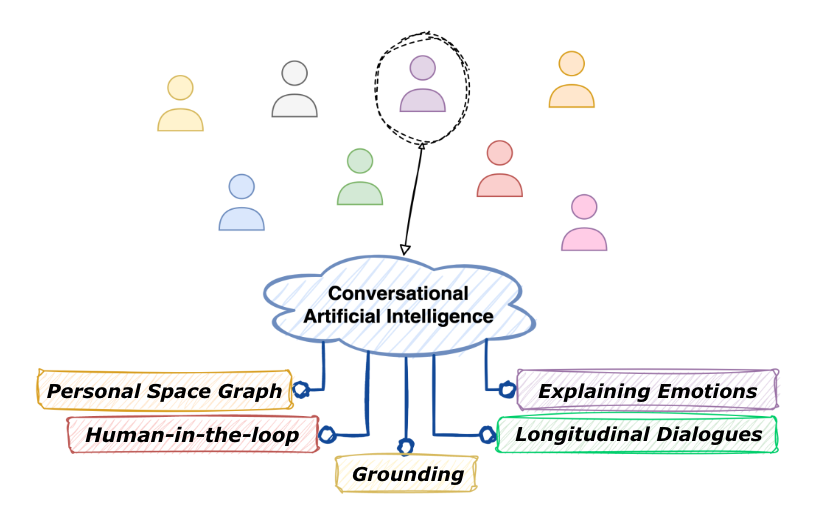These days we hear a lot about conversations between machines and humans and how powerful they could be if they brought benefits to people.
The Horizon 2020 project COADAPT was an ambitious project and brought together an Italian-Belgian-Finnish-Greek network of eleven partners. COADAPT’s mission was to support aging citizens to adapt to changing conditions in the workplace and personal life with diverse type of enabling technologies and systems.
The research group led by Prof. Giuseppe Riccardi at the Department of Engineering & Information Science ( University of Trento , Italy) lead the design and training of human-machine dialogue systems for mental health. While there is a lot of interest in the mental health domain for applying AI, most attempts have resorted to Eliza-style interactions devoid of natural language processing and conversation abilities.
The research group designed and piloted a novel conversational artificial intelligence system in the mental health domain. One of the most important novel feature is the ability to manage longitudinal conversations while engaging individuals for a long period of time. The system can understand and decode the context of the user’s behavior and provide personalized therapeutic support and manage user-specific conversations. Last but not least the AI systems interact with psychotherapist to provide an integrated human-in-the-loop experience.
In the research journey quite a few novel concepts were developed and validated. A novel methodology for eliciting and collecting dialogue data in the mental health domain [1], the concept of “Dialogue Follow-Ups” for conversational artificial intelligence systems. The team also improved several state-of-the-art models for understanding user emotions from text [2] and introduced the new concept of “Emotion Carriers” to explain emotions in natural language processing [3,4]. It was developed a model to construct the Personal Space of the users throughout the dialogue in order to model each user by his/her real-life events and participants [5]. The mentioned innovative models and ideas were further integrated in a personalized conversational model named “TEO Therapy Empowerment Opportunity” [6]. TEO was deployed in the field using the latest low-latency human-in-the-loop AI framework and helped both the patients and the therapists to achieve better interaction and therapy outcomes. TEO is the first conversational agent based on the latest natural language processing and machine learning achievements to be evaluated in a registered Randomized Control Trials (RCT) [6,7]. The research team demonstrated that participants who received traditional CBT treatment with the support of the m-health application were likely to report better satisfaction and more stable trend of improvement limited to the individual perception of stress related symptoms [6].

PUBLICATIONS
[1] Seyed Mahed Mousavi, Alessandra Cervone, Morena Danieli, and Giuseppe Riccardi. 2021. Would you like to tell me more? Generating a corpus of psychotherapy dialogues. In Proceedings of the Second Workshop on Natural Language Processing for Medical Conversations, pages 1–9, Online. Association for Computational Linguistics.
[2] Gabriel Roccabruna, Steve Azzolin, and Giuseppe Riccardi. 2022. Multi-source Multi-domain Sentiment Analysis with BERT-based Models. In Proceedings of the Thirteenth Language Resources and Evaluation Conference, pages 581–589, Marseille, France. European Language Resources Association.
[3] Seyed Mahed Mousavi, Gabriel Roccabruna, Aniruddha Tammewar, Steve Azzolin, and Giuseppe Riccardi. 2022. Can Emotion Carriers Explain Automatic Sentiment Prediction? A Study on Personal Narratives. In Proceedings of the 12th Workshop on Computational Approaches to Subjectivity, Sentiment & Social Media Analysis, pages 62–70, Dublin, Ireland. Association for Computational Linguistics.
[4] Aniruddha Tammewar, Alessandra Cervone, Eva-Maria Messner, and Giuseppe Riccardi. 2020. Annotation of Emotion Carriers in Personal Narratives. In Proceedings of the Twelfth Language Resources and Evaluation Conference, pages 1517–1525, Marseille, France. European Language Resources Association.
[5] Mousavi, Seyed Mahed, Roberto Negro, and Giuseppe Riccardi. “An Unsupervised Approach to Extract Life-Events from Personal Narratives in the Mental Health Domain.” CLiC-it. 2021.
[6] Danieli M, Ciulli T, Mousavi SM, Silvestri G, Barbato S, Di Natale L, Riccardi G. Assessing the Impact of Conversational Artificial Intelligence in the Treatment of Stress and Anxiety in Aging Adults: Randomized Controlled Trial. JMIR Mental Health. 2022 Sep 23;9(9):e38067.
[7] Danieli M, Ciulli T, Mousavi SM, Riccardi G. A Conversational Artificial Intelligence Agent for a Mental Health Care App: Evaluation Study of Its Participatory Design. JMIR Formative Research. 2021 Dec 1;5(12):e30053.

